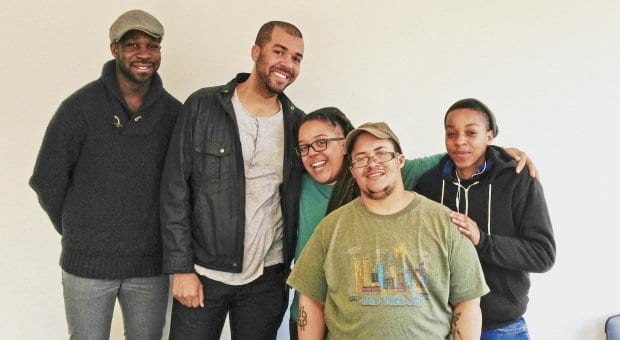“As soon as the sun started to go down, all of a sudden you just started to see people show up,” remembers Junior Harrison, one of the founders of Toronto Pride’s Blockorama stage, which celebrates the black and Caribbean queer community. “And the people that showed up were so thankful.”
“You could tell there was a need,” says Nik Red. Red was a DJ at that first iteration of the all-ages community space in 1999 and is now one of its organizers.
Fifteen years later, Blockorama is Pride’s largest and longest-running stage, featuring a wide range of entertainment, including DJs, burlesque, drag performers, ballroom houses, singers, rappers and more. But when it began as a humble stage at the corner of the Wellesley parking lot, Pride was a very different experience for people of colour.
“It started because there wasn’t a lot of programming at Pride for racialized queer and trans people, and in particular black people,” explains Syrus Marcus Ware, who is one of the primary organizers with Blackness Yes!, the collective that hosts Blockorama every year.
“What we wanted to see was a real, defined black queer presence in Pride,” adds Angela Robertson, who, like Harrison, was one of the group of friends who founded the collective.
Blocko, as it is known, began as an idea of Trinidadian-Canadian organizer Jamea Zuberi, who imagined a Carnival-style float in the Pride parade. Zuberi would eventually see her vision made reality in the form of her Pelau Masqueerade troupe, but at the time it became clear that logistically, something like a block party would be more feasible.
Since those early days, the space has grown, drawing thousands of people every year. But despite its success, it hasn’t always been easy to pull it off. “Our little tug of war with Pride never ended,” says Harrison, who was the stage liaison with Toronto Pride until stepping down in 2005. “I found that I had to constantly be reminding people who we are.”
Harrison remembers nightmarish Pride days, where Pride volunteers didn’t recognize the name Blockorama or when promised resources wouldn’t arrive. One year, the police interrupted the festivities, apparently unaware that the event was sponsored by Pride.
Tensions between Pride and Blockorama came to a head in 2010 when, after the Pride committee attempted to move the stage for the third time in four years, frustrated community members hosted an open consultation to create a resolution to the instability. Although many were dissatisfied with the results of that forum, Blocko is now firmly positioned at its original, and expanded, Wellesley Stage area. And it is impossible to ignore.
“We’re incredibly proud to congratulate Blackness Yes! on their contribution,” says Kevin Beaulieu, current executive director of Pride. “These folks have worked very hard to make sure Pride Toronto remains grounded in the community it serves.”
“It’s still relevant, it’s still necessary,” says writer and burlesque artist Dainty Smith, who has danced on Blocko’s stage in the past and will co-host this year’s event with performer Travoyintheflesh. “It’s about being able to see yourself. It’s about more than survival — it’s about thriving.”
Robertson agrees that political struggle must sometimes work itself out through a kind of positive energy. “Our lives often get constructed around why our identity . . . is fraught with struggle and challenge,” she says. “So this space was created as a celebration. By virtue of that, it was also a political act.”
This year’s Blockorama attendees will certainly find reasons to celebrate. Organizers will honour the stage’s founders throughout the day, and the entertainment will include sets by local heavyweight DJs Blackcat, Craig Dominic and Unruly Twin; singers such as Steve Foster; Toronto ballroom pioneers House of Monroe; and the return of drag superstar Michelle Ross. Out of towners include members of New York’s legendary House of Xtravaganza and the Blocko return of lesbian reggae musician Diana King.
But the real kicker is this year’s headlining act, 1990s R&B superstars En Vogue. The foursome broke into the scene in the early ’90s with their funky singles “My Lovin’ (You’re Never Gonna Get It)” and “Free Your Mind” and will grace the Blocko stage this year for the first time. Besides their hits, the group will also perform a Motown set.
Whether or not the space is explicitly political, the yearly block party makes a crucial and infectiously fun space amidst the enormity of the Pride festivities. “It becomes the space of reunion for activists, for our racialized LGBTQ family members, our allies and friends,” Robertson says, adding with a laugh, “and quite frankly, it has the best music.”
Blockorama 15
Sun, June 30
11:30am–11pm
TD Wellesley Stage

 Why you can trust Xtra
Why you can trust Xtra


